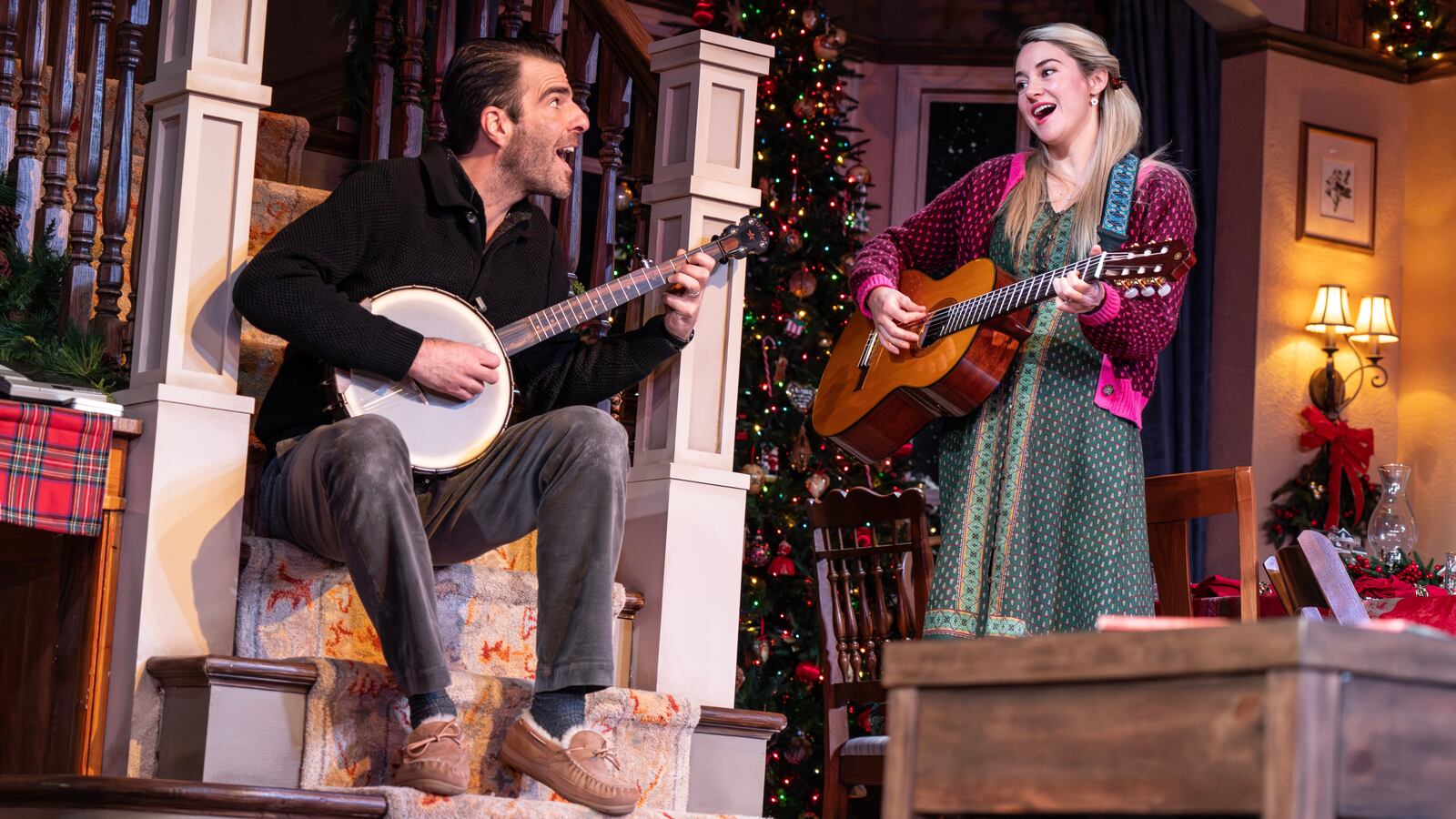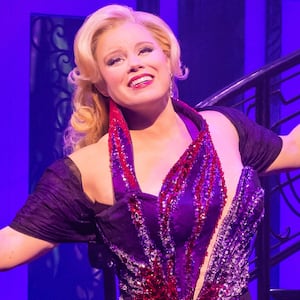Behold, a shimmering, twinkling Christmas overload. In front of us, as designed by Jon Lee Beatty, are garlands of colorful lights in a sumptuously cozy living room in a fancy Connecticut farmhouse on Christmas Eve, a majestically towering tree, even more twinkling lights, and snow falling in fluttering silence outside the misted-up windows.
How idyllic, inviting, and perfectly timed, Cult of Love looks (2nd Stage, Hayes Theater, booking to Feb. 2), with a festive New York City decked out in its own Christmas finery outside, and the Rockettes high-kicking just a few blocks away.
But, as the title of Leslye Headland’s Broadway play has it, there is something sinister behind the yuletide loveliness of the Dahl family living room; the “cult of love” that unfolds before us cuts all ways. At first it seems that the siblings Evie (Rebecca Henderson), Mark (Zachary Quinto), and Diana (Shailene Woodley) are simply in an amiable spin cycle of usual family joshing around their seemingly normie parents, Bill (David Rasche) and Ginny (Mare Winningham) as the family gets together for Christmas.
The Christian folk songs they sing as a family are fun and buoyant, but they also go on just long enough for the partners of the siblings (an exceptional Molly Bernard as Rachel, Mark’s wife, and Roberta Colindrez as Pippa, Evie’s wife) to look askance, just as we do. Yes, the parents and kids are fine of voice, but this also feels nutty.

Rachel and Pippa’s discomfort and disbelief at the Dahl family dynamics erupting before them matches ours. Bernard’s semi-drunk facial squalls subtly dominate whole scenes, while Colindrez holds the perfect beat in a key moment involving the giving and rejection of a portion of figgy pudding. Director Trip Cullman skillfully ensures our eyes do not stay trained on whoever is speaking, because there are so many reactions to those words to also monitor.
Headland mixes both uproarious comedy—along the lines, Christmas movie lovers, of The Family Stone, which kept nibbling at the edges of my mind (they’re not similar exactly, they just echo each other)—with the extremely dark explosion and consequences of Diana’s mental illness.
The sweet-faced sibling—played with a fierce and disturbing sense of self-certitude by Woodley—is anything but: she spouts spiteful homophobia at Evie and just as nasty things about miscarriages to Mark and Rachel. It is like she is quietly, proudly possessed. Her viciousness leaves both Evie and Rachel wanting to leave the gathering ASAP.

Diana’s husband, James, an Episcopal priest, is anything but a kindly man of God—as played by Christopher Lowell he appears to be more manipulative Svengali than devoted partner. He looks as innocent as a preppy kid playing croquet, the bounciest human Labrador, but he’s not—and when he and Diana are denounced by the cruelly targeted victims of their venom, the audience cheers. But we also see how ill Diana is, and how—furious and hurt as they are—how pained her loved ones are to see her in such dire mental straits. It leaves Quinto in a fetal, sobbing heap.
The play’s title comes to have multiple meanings: the close, yet self-sabotaging family unit we see is its own “cult of love” for good and bad; Diana and James are considering setting up their own church underpinned with their noxious beliefs—its own cult of love. Religion, faith, and their discontents is a cult of love in the play—not just how Diana and James have warped their own beliefs, but also Mark’s own retreat from his own early religious calling for a more bourgeois conventional life; and we also see the corrosive nature of religion when it comes to truly accepting and embracing LGBTQ family members.
With the introduction of the late-arriving sibling Johnny (Christopher Sears), with his friend Loren (Barbie Ferreira) another “cult of love” unfolds: drug addiction and recovery. Barbie is in crisp truth-telling mode, and not at all cowed by all the lunacy and judgment around her.

The cult of love within the Dahl family comes down to its parental heads. Rasche is a bumbling, well-meaning patriarch in the ever-more enveloping tendrils of Alzheimer’s. The play isn’t about that illness, but its incipient ravages pepper his character and outbursts of love; he just wants to hold his children, and remember holding his children, knowing that his memories of them, and his ability to be a dad, is on a horrible countdown to destruction.
Winningham’s mother at first seems like she is just a mom juggling dishes and her children’s back-at-home demands. But her own anti-gay prejudice, her own willful myopia, her own resentment when faced with criticism over her hypocrisies and prejudice, are played and folded in on each other beautifully by Winningham. Any fan of The Affair watching on will immediately recognize Ginny as a fictional cousin of Cherry Lockhart, the mom-meets-mafioso Winningham played in the Showtime drama.

In its most powerful scenes, the play proposes that biological family, and being biological family, isn’t everything, and that Christmas needn’t be an arena where everyone deceives themselves that it is. What if family members call time on the abuse, gaslighting, and cruelty they feel they suffered long enough—and leave the figgy pudding far behind for their own health?
The play doesn’t want to end sourly; at beginning and end it returns to the uniting power of song—the family’s warring members brought together by music. The unity is nice to see, but after all we have seen it also rings false.
As formulaic as some of the issues in the play feel (addiction, faith, prejudice, acceptance), the performers are so good—and Cullman such a great conjuror-of-activity as a director—it would be more effective for Cult of Love to stay true to its best, most uncompromising scenes, and deliver an unhappy ending.









